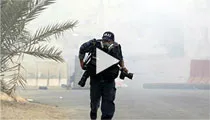Two years after the revolution that overthrew Zine el-Abidine Ben Ali, press freedom in Tunisia slid backward. Since the newly elected government assumed office in January, the authorities took several worrying steps that included the appointment of government allies as new heads of state television, radio, and print outlets. In April, three journalists were beaten while covering a protest, and in July, police officers attacked two journalists who were filming a collision involving a police cruiser and a train. In August, the authorities issued an arrest warrant for the head of a private television station, a Ben Ali ally who also hosted a satirical show mocking current government figures. In February, the authorities detained and fined three journalists for publishing a nude photo. Journalists said the government was ignoring two media laws adopted in November 2011 that were modeled on international press freedom standards, instead enforcing the previous, repressive laws. Members of the National Authority to Reform Information and Communication, a special commission set up to bring about media reforms, resigned en masse in July citing the government’s lack of commitment to press freedom.
Tunisia
» Press freedom recedes as government names allies to run news outlets.
» Security forces continue to assault and detain journalists.
Two years after the revolution that overthrew Zine el-Abidine Ben Ali, press freedom in Tunisia slid backward. Since the newly elected government assumed office in January, the authorities took several worrying steps that included the appointment of government allies as new heads of state television, radio, and print outlets. In April, three journalists were beaten while covering a protest, and in July, police officers attacked two journalists who were filming a collision involving a police cruiser and a train. In August, the authorities issued an arrest warrant for the head of a private television station, a Ben Ali ally who also hosted a satirical show mocking current government figures. In February, the authorities detained and fined three journalists for publishing a nude photo. Journalists said the government was ignoring two media laws adopted in November 2011 that were modeled on international press freedom standards, instead enforcing the previous, repressive laws. Members of the National Authority to Reform Information and Communication, a special commission set up to bring about media reforms, resigned en masse in July citing the government’s lack of commitment to press freedom.
Dar Assabah, established in 1951, is the oldest media house in the country and owns the Arabic-language daily Assabah and French-language daily Le Temps. In August, the government appointed Lotfi Touati, a former police commissioner and close government ally, as the new head of the media group. Touati's appointment stirred much controversy among Tunisian journalists for his close links to the ruling Ennahda party.
August 23: | Government appoints Touati as head of Dar Assabah. |
August 29: | Journalists accuse Touati of pulling planned articles in Assabah and Le Temps that would have criticized his appointment. |
September 11: | Dar Assabah journalists go on strike to protest his appointment. |
September 13: | A car driven by Touati strikes Khalil Hannachi, a reporter for Assabah, according to news reports. Hannachi was outside the Dar Assabah headquarters, waiting to confront Touati about recent decisions he had made regarding the media group, news reports said. |
Although no journalists were imprisoned when CPJ conducted its annual census on December 1, Tunisia detained three journalists over the course of the year and issued an arrest warrant for Sami Fehri, head of a television station whose programming was seen as critical of the government. A satirical show he hosted was considered particularly sensitive.
CPJ documented attacks against nine journalists over the course of the year, committed both by security forces and unidentified assailants. Six of the nine journalists were covering street protests when they were assaulted.
January: | 3 assaults >> Sofiane Bin Hmida, Nessma TV >> Sana Farhat, Le Temps >> Maha Ouelhezi, Web Manager |
April: | 3 assaults >> Fatma Riahi, Arabicca and Nessma TV >> Julie Schneider, Le Point >> Sofiene Chourabi, Nessma TV |
July: | 2 assaults >> Hiba Missaoui, Tunisia World Television >> Rahma Ghalle, Tunisia World Television |
August: | 1 assault >> Slim Trabelsi, Ettounsiya TV |
In February, Nasreddine Bin Said, owner and publisher of the daily Attounissia, and two editors for the paper were

